Welcome to the University Library
A very warm welcome to the University Library!
Whether you’re a fresher or a final year student we want to help you get the most from your Library. From discovering resources to finding the right study space, to where to go to get help with your coursework. So, here are a couple of ways you can settle in and join in at the Library:
Virtual Escape Game and Prize Draw
There’s something strange going on at the Library – something about dangerous magical beasts and impossible riddles. It all sounds like an elaborate freshers’ week prank…but what if there’s something more going on?
Challenge yourself to our exciting Escape Game and enter our prize draw to be in with a chance of winning a £25 Amazon voucher! (There are five runner-up prizes too, so lots of chances to win!) Play individually or work with a team of friends on Zoom (or other video conferencing tool of choice) to solve the puzzles and save the Library!
Newcastle Beginnings
The Liaison Team have been working alongside services from across the University to create and deliver our Library induction online as part of the Newcastle Beginnings programme. Available to all students in Canvas, it is designed to enable new students to get started with the Library and act as a refresher for returning students. You’ll find an introduction to our services, an overview of the resources and support available for your subject area, guides on how to get the best results from Library Search, and advice on accessing materials and support from the Library wherever you are studying this semester.
At the Library
Have you spotted our Click and Collect service or the Book a Study Space system yet?
This year’s rather unique circumstances mean that we’re managing our services and facilities more flexibly and that things may change at short notice. The best way for you to keep informed and up to date on availability of study spaces, and access to facilities and resources is to keep a weather-eye on the Library website, which will be regularly updated with any important changes.
We’ll be adding notifications to the Library pages of the University app and sharing news via our Twitter and Instagram pages too.
Want to ask us a question?
Library Help is available 24/7 – you can browse our FAQ database by topic or search it by using keywords; send us an email or chat with us about your query. We’re happy to help!
New resources for Science, Agriculture and Engineering 2020
We have been very busy over the summer adding to our growing collection of e-resources to support your studies and research. Discover individual titles in Library Search and browse some of the new collections now available to you below.
- American Society of Mechanical Engineers (ASME) digital collection
- De Gruyter Princeton Mathematical
- IEEE Wiley ebooks library
- IET Digital Library books
- IOP ebooks (including concise physics, expanding physics and AAS-IOP Astronomy collections)
- IEEE MIT Press ebooks
- Morgan and Claypool Synthesis 11
- Oxford Handbooks Online Business and Management
- Oxford Handbooks Online Economics and Finance
- Oxford Handbooks Online Physical Sciences
- Sage Business Cases
- Science of Synthesis
- Springer ebooks (including 2020 collections in biomedical and life sciences, computer science, earth and environmental science, engineering, intelligent technologies and robotics, medicine and social sciences)
- Synthetic Methods of Organometallic and Inorganic Chemistry (10 volumes)
- World Scientific ebooks (including 2020 collections in computer science, engineering, environmental science, life sciences, medicine and healthcare, physics and astronomy, non-linear science, chaos and dynamical systems)
We have also invested in continued access to our Evidence-Based Acquisition (EBA) collections from multiple publishers, so you can browse and access hundreds of ebook titles and we can see which are the most popular titles for our students and researchers.
It’s as easy as…Reading Lists
As an academic, there are 5 easy steps to creating your own reading list on Leganto, our Reading Lists service, for your students:
- Access or create your reading list via your VLE (e.g. Canvas).
- Add resources from Library Search and other sources (e.g. Blackwell’s Book Shop).
- Tag each item using the appropriate tag (i.e. essential, recommended or background reading), where:
Essential = very important to the course, all students will need to use this text.
Recommended = supplementary texts which students are encouraged to use.
Background = additional texts which are suggested for background subject area reading. - Send your list to the library for checking and stock orders.
- Publish your list to ensure your students can access it.
Things to know:
Tagging each item with essential, recommended and background can generate book orders: there are book/student ratio ordering criteria for items being added to library stock and tagging will allow informed decisions to be made by the Library’s team.
Given we are in the midst of a pandemic and teaching is being undertaken in a different way this term, the Library will attempt to obtain access to all resources online (e.g. e-books) where possible. Please note we do try our best but not everything is available online! Where we can’t obtain an online resource, we will usually opt for the print instead.
There is a Canvas course prepared for you to learn how to use Reading Lists. It’s short and full of useful information on making the best use of the service for your students. Self-enrol on Reading Lists Training for Staff today.
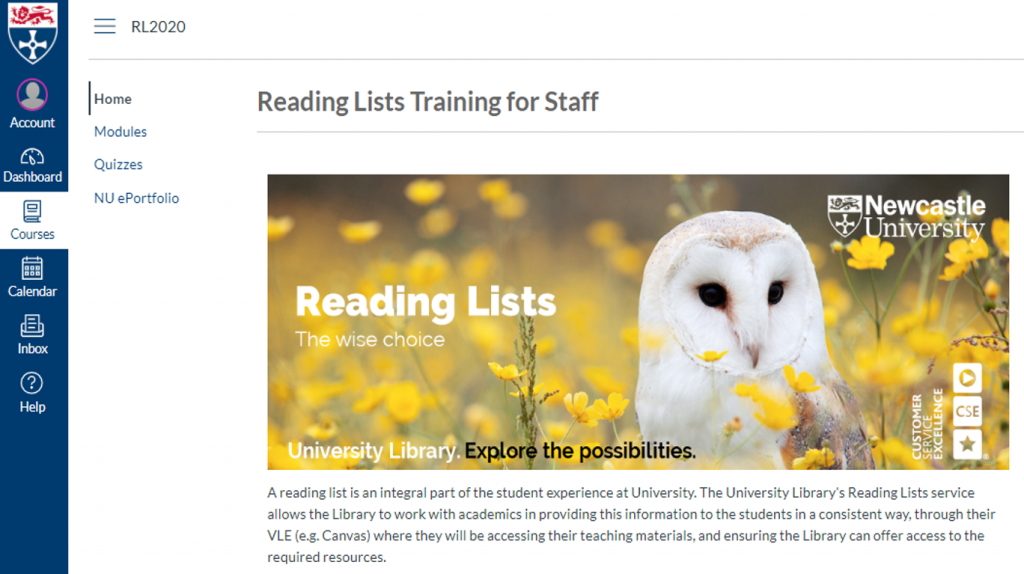
If you would prefer to submit your reading list or lecture/seminar handout to a dedicated team of Library staff to be processed, use the submission form or email the lists to readinglists@ncl.ac.uk for support.
So, Reading Lists are a great way to let your students know what they need to read, and to keep the Library informed too; they are the wise choice.
Reading Lists and Canvas
The University’s Virtual Learning Environment has been changed to Canvas. After years of using Blackboard, it’s a bit different! But once you start to use it, you’ll find it’s much easier to present the information your students need, to communicate with your students in word, sight and sound, and to work more easily in this online world brought on us by the pandemic.
Why talk of Canvas when this post is about Reading Lists? Well, Canvas makes your reading list for each module more visible so you are more likely to be asked about the lists by your students.
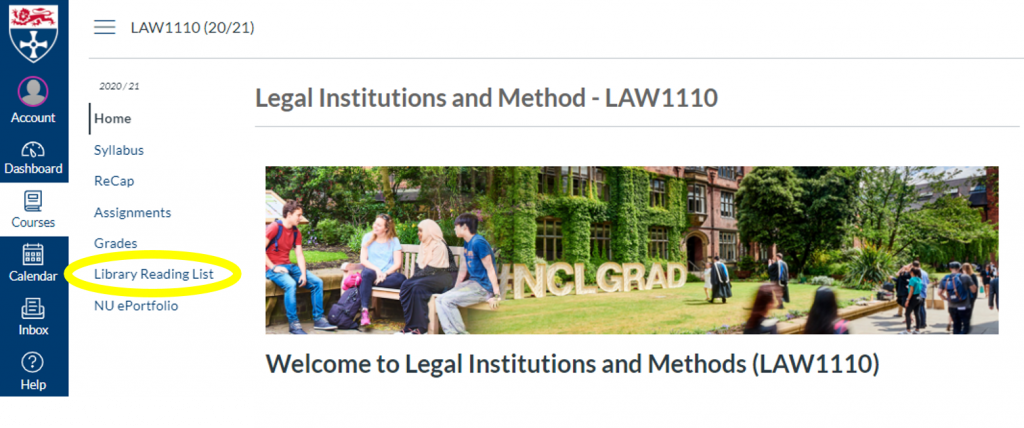
The LTDS Canvas Baseline states ‘…where relevant a reading list must be provided.’

So what you should do? Not all modules will need a reading list. But if you do have books, book chapters or journal articles you want your students to read and would like to learn how to manage items on your Reading List yourself, please self-enrol on the Reading Lists Training for Staff course which is available via Canvas. It will explain each stage of creating and editing your lists and will allow you to keep in touch with the Library about the materials you need to support your teaching.
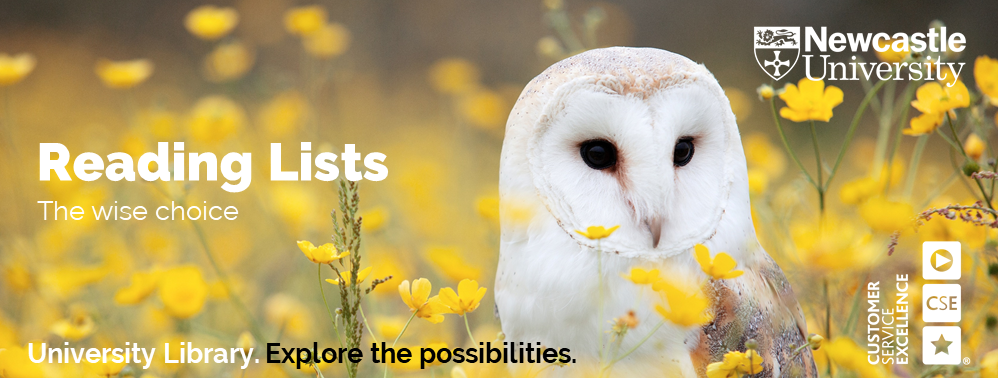
Alternatively, you may wish to produce your reading list in a Microsoft Word document, or module handbook, and submit this to our dedicated Library Reading Lists team to create your online version.
If you have any questions about Reading Lists, please contact Library Help and a member of the Reading Lists team will be in touch.
Reading Lists
A reading list is an integral part of the student experience at University. Although it may be viewed as an archaic term these days, students are ‘reading’ for a degree. How do the students know what to read? It is the academic’s role to guide them.
The University Library’s Reading Lists service (Leganto) allows the Library to work with teaching staff in providing this information to the students in an online and consistent way, through their Virtual Learning Environment (Canvas or the Medical LE) alongside their teaching materials.
The University Library’s Reading Lists service is routinely promoted to the students throughout induction. It contains essential, recommended and background reading for modules taught within Newcastle University. Now we’re using Canvas, it also appears in the standard menu within each course and will be more accessible than in our former VLE.

So, as teaching staff, what are the benefits of using this service?
- You have control and can create, manage and update your own reading lists online.
- The Library will ensure online access to resources (if available). If an e-book is not available then the correct number of print copies will be purchased based on the essential, recommended or background reading tags you apply to each item on your list.
- Essential, recommended and background reading tags help students prioritise their reading.
- CLA scans (digitised book chapters and articles) can easily be requested and acccessed through Leganto. There will be no need to email us or fill out a web request form; simply tag the item on your list and the Library will do the rest.
- The same principle applies to new books. Once on the reading list this information will trigger adding new material to our stock – there will be no need to contact us separately.
- You can export a reading list to your module guide or handouts. This will save you time by only needing to create the list in one place.
Using this system is a wise choice as it ensures the Library knows what you need to support your teaching and will offer your students direct access to the required resources.
You can find more information on this service via our website, or contact the reading list email.
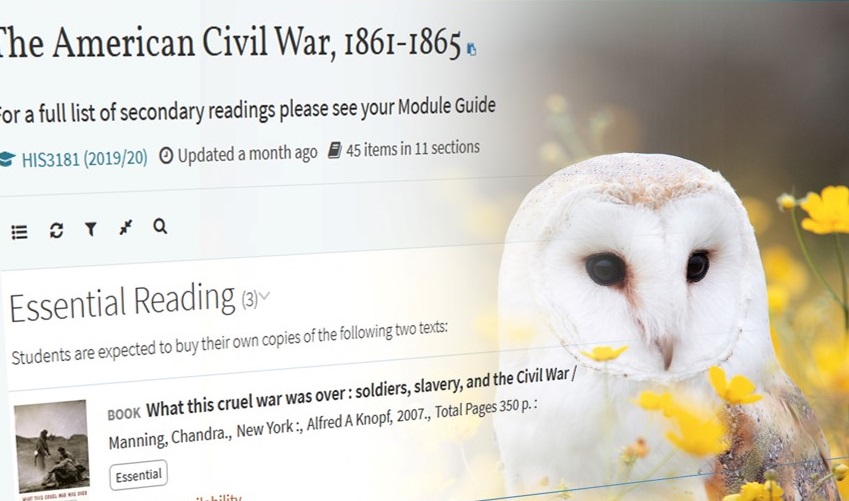
New resource: Westlaw Edge UK
Westlaw Edge UK. Is this a new resource? Possibly not by definition, but it is most certainly a significant enhancement within the existing Westlaw UK service.
Westlaw Edge UK (not to be confused with the Microsoft Edge browser) is available via the Law Subject Guide and Library Search within Westlaw UK. Once logged in with your Newcastle University Campus ID and password you will find the tools available to help you keep currently aware and able to anticipate change – skills which are incredibly important to develop as a law student to be carried into your legal career.
These tools include:
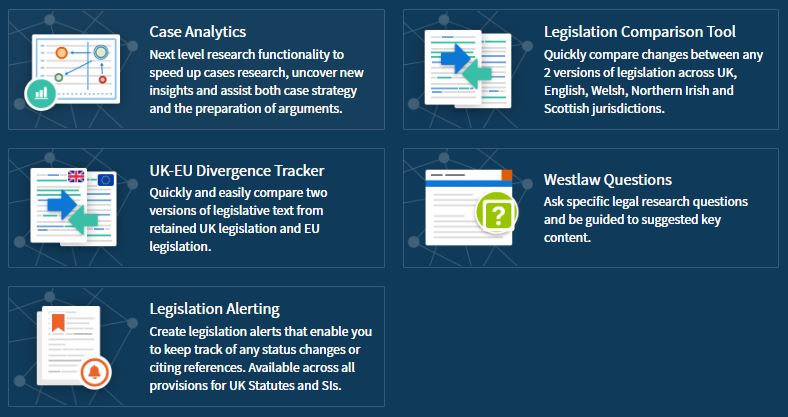
With inclusion of an interactive precedent map within Case Analytics to easily locate relevant cases…
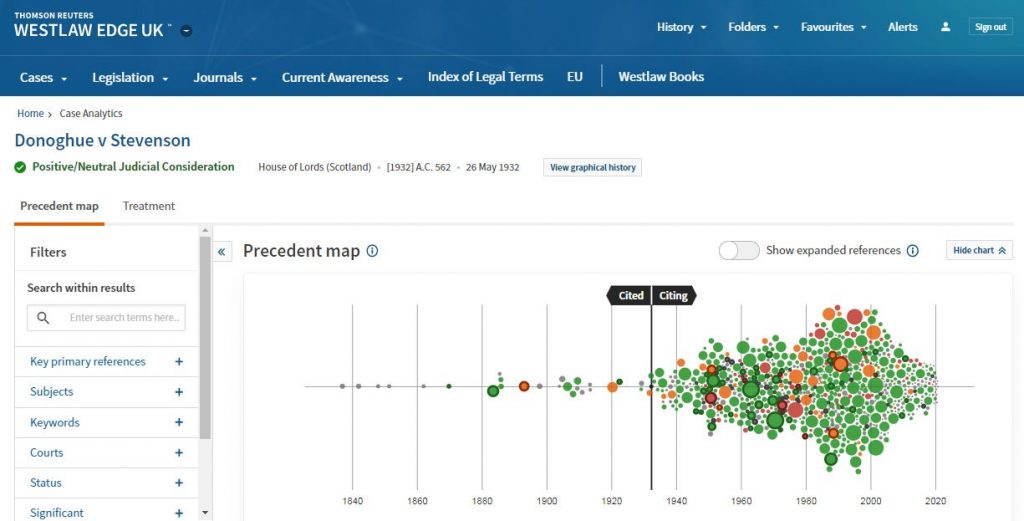
…and the UK-EU Divergence Tracker to assist with analysing the legal implications of Brexit, it’s even easier to carry out effective and efficient legal research.
You can go beyond search results lists with AI-suggested relevant research and resources tailored to your needs. Skynet hasn’t got a look in. Go on, don’t be slow. Lose yourself in Westlaw Edge UK and get ahead.
Make the most out of your library’s resources

Key resources
Do you have an assignment or research question and don’t know where to start? Search no further, your subject-specific LibGuide is only a few clicks away.
Follow the link above and then choose the Faculty and relevant School. Once you are there you will see the key resources that are provided for you:

Navigate to the ‘Journals and Databases’ tab. This will display the databases where you can search for the journal articles that you need. Don’t know how to use this avalanche of links? We have instructions:

From the Databases tab, click on the next tab along, in the centre of the screen that reads ‘Journals and Database Help’.
One-to-one help
Is the information too vast and you feel like you’ve hit a wall? You can ask your liaison librarian team for help. From the same navigation menu on the left side of the screen, click on ‘Subject Help and News’. There, you can find the team’s contact details and further down the page, you can request to book a one-to-one consultation with a member of the team.
Academic skills
Do you feel that your academic skills need to be polished a little? Don’t hesitate to look at our Academic Skills page from the Subject Support page:

You will find more guides on this page relating to how to find academic information, reference it, using EndNote, distinguishing between real information and fake news and many more.
Academic Writing
You can also get one-to-one help from the Writing Development Centre if you are struggling with study skills or academic writing.
Library Help
Do you have any specific questions? Please contact us via Library Help where we monitor your live chats and emails or have a look through our FAQs.
New Resource: Max Planck Encyclopedias of Public International Law
The Max Planck Encyclopedias of Public International Law (MPIL) is now available to Newcastle University staff and students, particularly to those with an interest in international law. This is the definitive reference work on this subject area with over 1,700 peer-reviewed articles, authored by over 900 leading scholars and practitioners, to support your research.
MPIL gives access to the Max Planck Encyclopedia of Public International Law (MPEPIL) and the Max Planck Encyclopedia of International Procedural Law (MPEiPro) via Library Search or our Law Subject Guide using your Campus ID and password.
Once accessed, you can use the main menu to browse, select a subject area or locate an author who writes in your chosen field in the MPEPIL and MPEiPro. An overall search function, with basic and advanced searching, is also available.
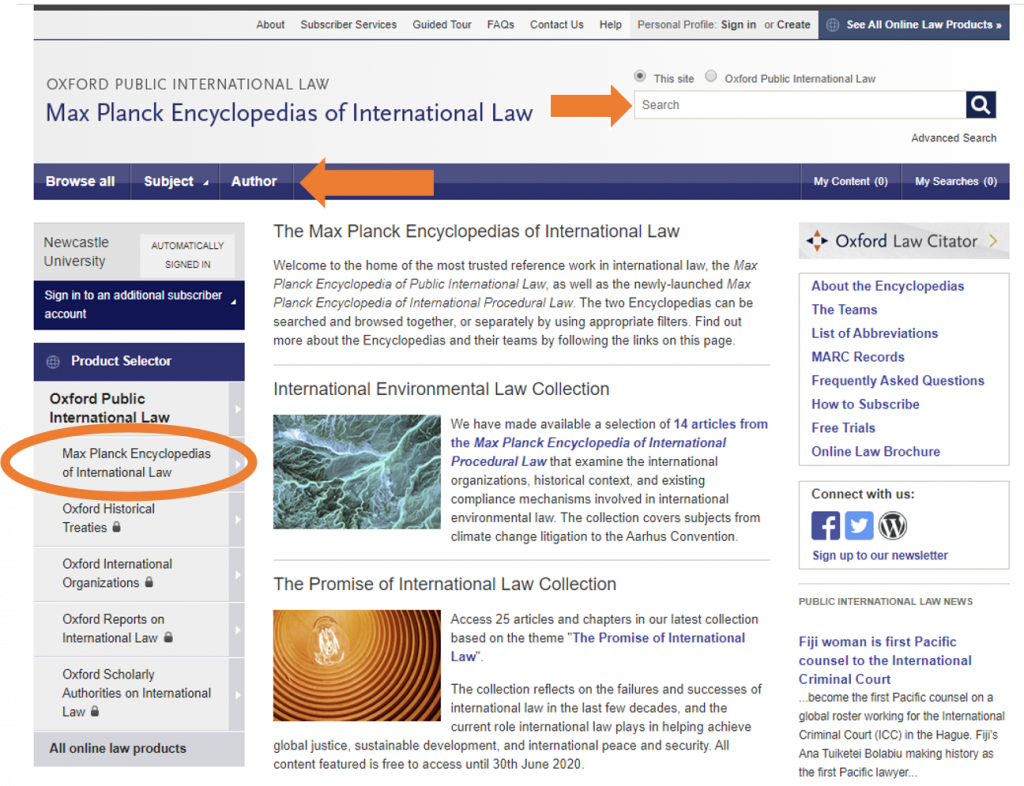
Oxford University Press will give you a quick guided tour of the resource [7:22 mins]:
If you have an interest in PIL, international environmental law, peace, Treaties, human rights, refugees, use of force, space law, international criminal law or the law of the sea then this resource will be useful to you.
Your search results are in full-text format with cross-referencing within MPEPIL and MPEiPro, including links to external websites or case law. Results can be printed in PDF format, saved, emailed and shared. You can also sign up for current awareness alerts in relation to specific articles.

You can also expand your research with the Oxford Law Citator, linking to related content in relation to your topic of interest. This is useful to use in conjunction with the Personal Profile function where you can register as an individual user and save any results you find.
If you have any feedback on this resource, please leave a comment on this post or email our Law Liaison Librarian.
New Resource: OUP Law Trove
Update! Following trial access, we now have a subscription to this resource for 2020/21.
This Oxford University Press resource contains most of the essential, recommended and background reading titles you would normally find listed in your module handbooks and on the Law Library shelves. We have temporary access to OUP Law Trove to ensure our staff and students can study from home.
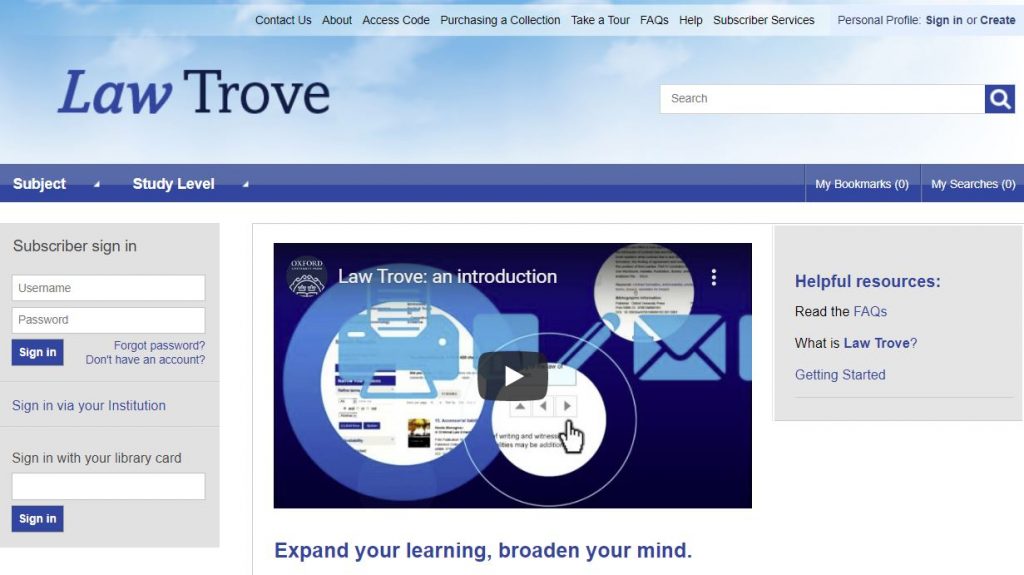
You can access OUP Law Trove directly via Library Search (log in with your Campus ID and password).
You can search by author, title, keyword, or narrow your search to those titles available to us alone by selecting Show titles in my subscription (left-hand menu). As of July 2020, there are 210 books.
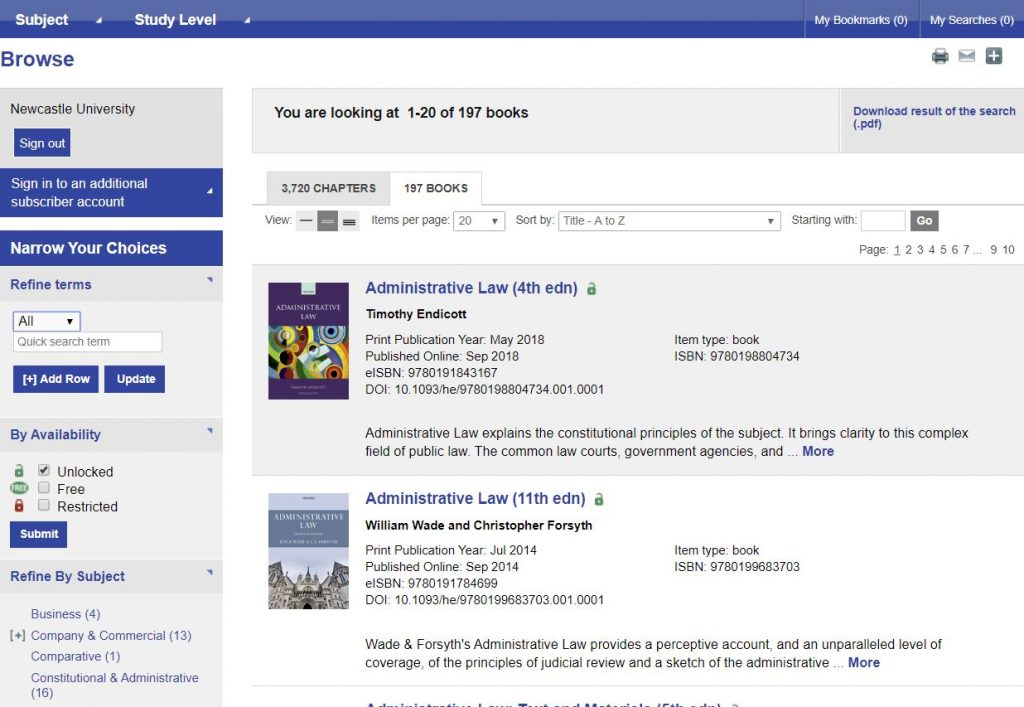
You can further narrow your results by refining by subject using the options available in the left-hand menu.
If you prefer, you can take a tour of the resource before diving in.
If you have any feedback on this resource, please leave a comment or contact libraryhelp@ncl.ac.uk.



